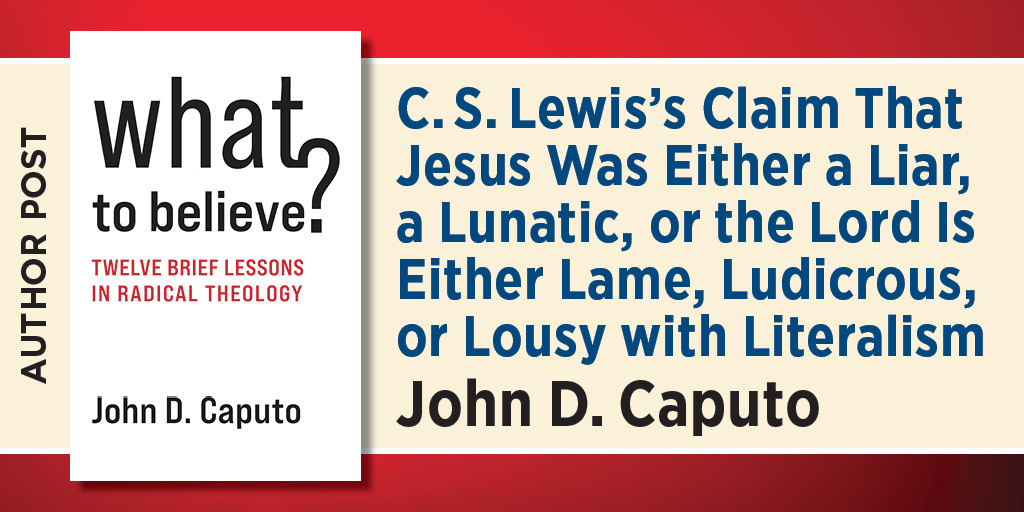C. S. Lewis’s Claim that Jesus was Either a Liar, a Lunatic, or the Lord Is Either Lame, Ludicrous, or Lousy with Literalism
John D. Caputo

The problem with religion is that, with each passing day, as the Pew polls keep showing, it is making itself more and more unbelievable, and the people who try to defend it make it worse, so we do not know what to believe. That, I thought, is a good title for a book, but with a question mark, What to Believe?
Thomas Aquinas’s famous “five ways,” his five proofs for the existence of God, do not persuade anybody who is not already a believer, but at least they made a certain amount of sense and you can see what he is getting at. C. S. Lewis, on the other hand, should have stuck to literature and left making arguments to the philosophers. Lewis’s claim that the Jesus of the New Testament is either a lunatic, a liar or the Lord is, to sustain the alliteration, lame, ludicrous, and literalistic. It is one of the more embarrassing arguments, if that is what it is, in the history of apologetics, which is itself an embarrassing history. Apologetics is thinking backward. Instead of being led by the facts, it leads with the conclusion and then backtracks, looking for premises that would justify the conclusion, what was already drawn. Then, at the end, it declares its conclusion “warranted.” Can you believe it? But even in a history as embarrassing as that, the lameness of Lewis’s argument stands out, partly because it draws Jesus (who is an innocent bystander in this whole thing) into a mess of Lewis’s own making and partly because Lewis should have known better. The Jesus of the New Testament is neither a lunatic (self-deceived) nor a liar (deceiving others), but literature. You would have thought that an “Oxbridge” professor of literature, the author of a classic like The Chronicles of Narnia, would have noticed that. The New Testament is literature. Mere Christianity should not be sheer nonsense.
The confusion Lewis is creating was dispelled a long time ago, in a debate between the rationalists and the supernaturalists about the miracles that Jesus performed, in which neither side gave much evidence of knowing anything about literature. The rationalists set about explaining the miracles by explaining them away. Jesus was not really walking on water. He was walking on large stones at water level that, from a distance, made it look like he was walking on water. Lazarus was not dead; he was in a coma from which Jesus awakened him. Thomas Jefferson, who was a Deist (a rationalist who said God was like a clockmaker who wound up the clock and thereafter paid it no mind), actually took a pair of scissors to the New Testament in which the miracle stories ended up on the cutting-room floor. The Christian right thinks that the “founders” were all Bible-thumpers, not Bible-butchers, and that this story is fake news, which means that the torso of the New Testament on display at Monticello must have been planted there by the Deep State. Still, the supernaturalists had a point. They said, if that is all Jesus is, a good man who got himself killed for speaking truth to power, we don’t need Jesus, which is the point that Lewis was trying to make, however lamely. We already have Socrates and today the bumper stickers and billboards in rural America would read, “what would Socrates do?” So the supernaturalists insisted that we take the New Testament on faith, as the word of God and the ipsissima verba, the “very words” of Jesus. Ergo, Jesus was either looney or a liar or the Lord.
So, the real question is, how can we take Jesus seriously, and see that he has a special importance, without naturalizing him into just another man or supernaturalizing him into a water-walker?
So, the real question is, how can we take Jesus seriously, and see that he has a special importance, without naturalizing him into just another man or supernaturalizing him into a water-walker? The answer is, this is literature. As any professor of New Testament studies can tell you (make that any professor teaching in a reasonably well-populated area!), these are stories handed down over several decades, orally, in Greek translation (Jesus spoke Aramaic; they can’t be his very words), and finally written down, long after the death of Jesus, by people who had never laid eyes on him. The “good news” is not a news report. A modern equivalent might be a folk song about a legendary hero or a “historical novel.”
For example, when, at the end of Jane Eyre, Mr. Rochester cries out for help from many miles across the moors, “Jane, Jane,” and Jane hears him and rushes to his aid, nobody objects that this couldn’t happen because Mr. Rochester was out of hearing range. Nor does anybody rise to Jane’s defense and say, Jane is either lying or looney or she must have really heard Mr. Rochester. Same thing with the ghosts of Shakespeare. Everybody knows this is literature, and that means we undertake what Samuel Taylor Coleridge called a “willing suspension of disbelief” (we intentionally set aside our natural skepticism) for the sake of getting into the story and understanding its point.
But wait! The New Testament is not just literature. This is sacred literature, religious literature. True, but that does not mean that the authors of the New Testament followed Jesus around, pen and pad, well, quill and scroll in hand, taking notes, so that those famous paintings of Jesus praying in the Garden of Gethsemane should, in the interest of accuracy, have included the Evangelist over in the corner taking notes. It means that the authors of the New Testament thought that Jesus was special, not just a good man or a moral teacher, but that the story of his life and death tell us something important about God, about what Christians (Jesus never heard of “Christians”) mean when they use this word God, so it is not just a poetics but a theopoetics. Just so, Charlotte Brontë was not reporting Jane’s preternatural powers of hearing. She was telling us a story about what it means for two people to love each other as much as do Jane and Mr. Rochester. Nobody is mendacious, nobody mad (well, there is the first Mrs. Rochester in the attic). This is literature. My thought in What to Believe? is to get even bolder and ask whether “God,” too, might be like that, an imaginative figure, a protagonist in a story, which is making a point of general import, whether or not you actually “believe in God.” That is what we call, back in the academy, “radical theology.” So I decided to write a book explaining stuff like that about religion in plain (nonacademic) English and then maybe religion would not be so unbelievable.
John D. Caputo is the Thomas J. Watson Professor Emeritus of Religion and Humanities at Syracuse University and the David R. Cook Professor Emeritus of Philosophy at Villanova University. He is the author of What to Believe?: Twelve Brief Lessons in Radical Theology.


